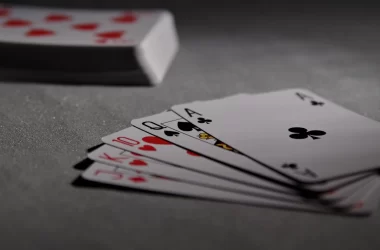Poker is a challenging game requiring complex decisions. It involves multiple factors including body language and psychology that must be managed successfully for optimal play. Learning how to declutter your mind and avoid distractions are also essential elements in creating winning strategies.
Examining the game and watching experienced players helps develop quick instincts. It is vital that emotions do not cloud judgment and lead to reckless play, otherwise foolish play could ensue.
Game of chance
If you want to become a pro at poker, you must learn to focus on winning hands. This requires practice and an adequate bankroll which is always ready for playing; this helps prevent tilting and reduce losses.
Reading other players’ tells is another key skill. While this often encompasses body language and facial expressions, more specific details may also emerge – for instance watching their speed of decision making, how they handle chips and cards or even eye movements.
As part of developing quick instincts, it’s also essential to observe your opponents carefully in order to build quick responses. One great way of doing this is studying experienced players and visualizing how you would respond in their position if placed in their shoes – this allows you to gain an edge against them! Observation provides insight into who your rivals are as well as opens doors on how best to beat them.
Game of skill
Poker is a game of skill, and to win at it you must develop confidence when playing it. Focusing on preflop hands that give you an edge and playing them aggressively will put you ahead of the competition. In addition, be consistent in making decisions – any hesitation can reveal weaknesses to more experienced opponents and cost big bets!
Consistent poker playing will also strengthen your mental strength, making the game much less emotionally draining and discouraging losses from becoming emotionally distressful. Being emotional only clouds your judgment further and can result in poor decisions leading to greater losses.
Be mindful that poker is a long journey with many obstacles along the way, and odds won’t always favour your success – however you can improve your odds by learning from experienced players.
Game of psychology
For the ultimate poker playing experience, it is imperative that you learn to read your opponents’ body language. Pay particular attention to their betting patterns and nervous habits which may reveal information about their hand strength; by keeping an eye on other people’s actions you can avoid giving away information about yourself or any information from your hand that would compromise it.
Emotions should also be managed. Emotions can derail your plan and expose you to bad beats; this is particularly relevant when chasing losses for long periods. Therefore, it is wise to step back from your situation objectively before acting upon your emotions.
Your goal should be to devise a concrete plan for how you will approach each game, with the intent of improving your odds of victory and encouraging continued progression toward your goals. A structured approach will prevent bad luck or bad beats from dissuading you.
Game of bluffing
Bluffing in poker is an essential skill that enables you to convince opponents you have an impressive hand even when they do not. A well-timed bluff may make them call your bet and lose chips; on the other hand, an unsuccessful one could jeopardise your chances of victory altogether.
Effective bluffs must be deceptive and not appear like value bets, which can be achieved by placing small bets that represent strength or betting with clear intentions in mind. Furthermore, your opponent’s previous action, table image and nonverbal tells must all be taken into consideration before making this decision.
As soon as a hand is underway, it is wise to bluff more often on early streets and less on later streets. This strategy takes advantage of your bluffing range having more equity versus an opponent’s calling range preflop and declining as play progresses; furthermore, larger bet sizes often force opponents out when you hold the nuts.







